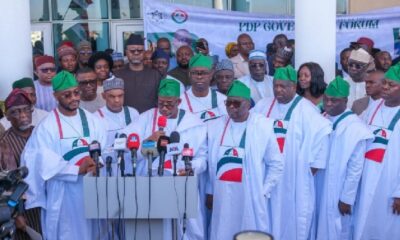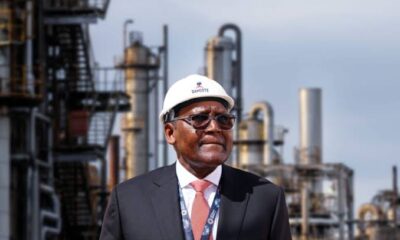News
Current Cement Prices: Dangote, BUA, and Others This Week

Cement prices in Nigeria have remained volatile due to a combination of local and global economic pressures, infrastructural challenges, government policies, and market-specific dynamics. This price unpredictability affects key sectors like construction and real estate, where stable cement prices are critical to project planning and execution.
Factors Contributing to Cement Price Fluctuation
1. High Production Costs
Cement production in Nigeria is capital- and energy-intensive, with significant costs associated with raw materials and energy:
Energy Costs: The reliance on diesel and gas generators due to erratic electricity supply inflates production costs.
Raw Materials: Despite Nigeria’s abundant limestone reserves, mining and transportation costs are high due to inadequate infrastructure and security challenges.
2. Limited Industry Competition
Nigeria’s cement industry is dominated by a few major players: Dangote Cement, BUA Cement, and Lafarge. This oligopoly structure reduces competitive pricing:
High Entry Barriers: Capital-intensive investments deter new entrants.
Import Restrictions: Policies limiting cement imports strengthen local manufacturers’ market control, restricting competition and enabling price manipulation.
3. Logistics and Transportation Challenges
Poor infrastructure and security issues increase transportation costs:
Road Infrastructure: Bad roads lead to delays and higher fuel consumption, with costs passed to consumers.
Insecurity: In regions like the North, insecurity increases logistical risks, raising costs for manufacturers and distributors.
4. Exchange Rate Volatility
The naira’s fluctuating value against foreign currencies impacts the cost of imported machinery, spare parts, and raw materials. These costs are often offset by frequent adjustments in cement prices.
5. Demand-Supply Imbalance
High demand driven by urbanization, population growth, and government infrastructure projects often outstrips domestic supply:
Periodic Shortages: Insufficient production capacity leads to supply gaps.
Import Restrictions: Policies aimed at promoting local production reduce overall supply, contributing to higher prices.
6. Taxes and Levies
Cement manufacturers face significant taxes and levies, which are typically transferred to consumers through increased prices.
7. Market Speculation and Hoarding
Speculative practices further destabilize prices:
Hoarding: Distributors hoard cement to create artificial scarcity, driving up prices.
Speculation: Rumors about policy changes or supply disruptions lead to panic buying.
8. Infrastructure Deficiencies
Nigeria’s infrastructure issues exacerbate supply chain inefficiencies:
Port Congestion: Delays at ports affect the timely import of production inputs.
Storage Facilities: Limited storage for raw materials and finished goods contributes to supply shortages during peak demand periods.
9. Global Economic Trends
External events like the COVID-19 pandemic and the Russia-Ukraine war have disrupted supply chains and increased the cost of key production inputs like gypsum and coal, amplifying local price instability.
10. Security Challenges
Security concerns, particularly in mining regions, affect raw material availability and increase risks along distribution routes, inflating overall costs.
Current Cement Prices in Nigeria (Week Overview)
| Cement Type | Price (₦ per 50kg bag) |
|---|---|
| Dangote Cement | ₦9,400 (varies by location) |
| BUA Cement | ₦7,700 |
| POP (Plaster of Paris) Cement | ₦9,700 |
| Lafarge Waterproof Cement | ₦8,900 |
| Water Shield High-Quality Cement | ₦12,000 |
Recommendations for Addressing Price Instability
A multi-pronged approach is essential to stabilize cement prices and ensure sustainable growth in Nigeria’s construction and real estate sectors:
Improve Infrastructure: Upgrading roads, ports, and storage facilities will reduce transportation and logistical costs.
Foster Competition: Encourage new entrants by reducing capital barriers and revisiting import restrictions to increase supply options.
Stabilize Exchange Rates: Strengthening the naira through sound fiscal policies will lower the cost of imported inputs.
Enhance Energy Supply: Investing in reliable electricity infrastructure will reduce reliance on expensive generators.
Regulate Taxes and Levies: Introducing tax reliefs for cement manufacturers can reduce production costs and lower market prices.
Without these interventions, cement prices in Nigeria are likely to remain unstable, posing significant challenges to the nation’s development agenda.
News
Lawmaker Slams NBA Over Rivers Crisis, Demands Return of N300m

News
BREAKING: Unknown gunmen reportedly storm Senator Natasha’s family residence

Senator Natasha Akpoti-Uduaghan’s family residence in Kogi was reportedy invaded by gunmen around 1 a.m. on Tuesday, April 16, leaving damaged windows but no injuries.
The incident happened at her hometown residence in Obeiba-Ihima, located in Okehi Local Government Area of Kogi State.
Sources familiar with the event said the attackers arrived around 1:00 a.m. Armed with cutlasses and guns, they damaged parts of the building, smashing windows and causing panic in the area. At least three men were involved in the attack.
Senator Natasha’s Chief Security Officer, Yakubu Ovanja, quickly informed the appropriate security agencies.
In response, officers from the Okehi Police Division rushed to the scene.
Although nobody was hurt and no suspects have been arrested yet, security officials recorded the extent of the damage and launched a preliminary investigation.
The reason behind the attack is still unknown, and as of now, Senator Akpoti-Uduaghan has not released any official statement. She represents Kogi Central in the Senate and is known as a vocal figure in Nigerian politics.
According to Zagazola Makama, police are still trying to figure out what motivated the attackers and are working to find those responsible.
News
SAD! Again, Alleged Herdsmen Attack Three Benue Communities

The communities came under simultaneous attacks just a day after the killing of 11 persons at Otobi Community also in Otukpo LGA.
Benue has in the past decade experienced incessant attacks.
Suspected herdsmen have again stepped up violent attacks as no fewer than three communities in the Otukpo Local Government Area (LGA) of Benue State were attacked on Wednesday.
The communities affected during the fresh attacks include Emichi, Odudaje, and Okpamaju all in Otukpo where five persons were killed in February. The communities came under simultaneous attacks just a day after the killing of 11 persons at Otobi Community also in Otukpo LGA.
Local sources confirm that several people may have been feared dead again in the fresh attack.
Wednesday’s attack came hours after Governor Hyacinth Alia confirmed the arrest of three suspected herders in connection with the invasion of Otobi village on Tuesday night.
When contacted, Otukpo LGA Chairman, Maxwell Ogiri, confirmed the attack on the three communities, saying that the attackers stormed the communities at the time when the Commissioner of Police was still at the Ochidoma Palace over the previous day’s attack on Otobi.
He added that three people sustained injury in the attacks on the three communities, leading to women and children abandoning the communities for fear of being killed.
“Only young men were in the communities when the attackers arrived. The prompt response from combined security operatives made the attackers flee and none of them were arrested,” Ogiri stated.
The police spokesperson in the state, Sewuese Anene, was yet to confirm details of the attacks on the three communities.
-

 News23 hours ago
News23 hours agoPDP governors declare support for Tinubu
-

 News24 hours ago
News24 hours agoHope for Nigerians as Dangote refinery slashes petrol price again
-

 News52 minutes ago
News52 minutes agoBREAKING: Unknown gunmen reportedly storm Senator Natasha’s family residence
-

 News24 hours ago
News24 hours agoRivers Emergency Rule: Abbas inaugurates 21-member panel
-

 News23 hours ago
News23 hours agoN1.3trn CBEX Scam: EFCC caution Nigerians against Ponzi Schemes
-

 News4 hours ago
News4 hours agoSnub story on removal of Rivers Sole Administrator, it’s FAKE-Chief Registrar
-

 News10 hours ago
News10 hours agoFG expresses sympathy for CBEX victims, urges a united effort to combat Ponzi schemes
-

 News9 hours ago
News9 hours ago“How my father escaped assassination” – Bishop Oyedepo’s daughter

















